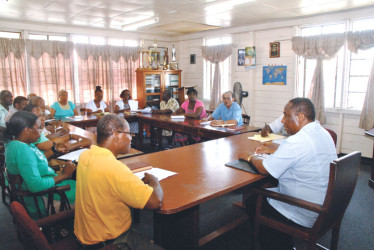The financial deprivation which public servants have had to endure on account of decades of having to be satisfied with wages and salaries levels that have failed to keep pace with the cost of living is a “historic injustice,” the responsibility for which has to be placed at the feet of the employer,” President of the Guyana Public Service Union (GPSU) Patrick Yarde said on Monday.
“I believe that the issue that must now be dealt with is whether it is at all reasonable for this nation to ask public servants to wait any longer to be granted pay increases that not only remove those huge cost of living challenges but, equally importantly, better positions them to live up to the performance expectations of government. I believe that this entire nation will applaud our government if it makes such a move,” Yarde told Stabroek Business.

On Tuesday, Yarde met with his Executive Council ahead of a media briefing at which he sought to send a message to government that it was “neither fair nor reasonable” to ask public servants to await the outcomes of the Commission of Inquiry into the Public Service ordered by President David Granger before talks on wages and salaries increases can commence between government and the union. Asked about measures the union might take towards this, Yarde said, “My relationships with other institutions, including the Government of Guyana are informed, first and foremost, by my obligation to public servants.
“We have reached a stage where the issue of public servants wages and salaries cannot any longer be seen as a matter that can wait. It is not that this union does not accept that there are other issues pertaining to the welfare of the public service that will arise out of the work of the Commission of Inquiry. The issue here is the immediacy of the crisis as far as the wages and salaries crisis are concerned. It is a humanitarian issue, a today issue.”
Yarde told Stabroek Business that arising out of the meeting with the union’s Executive Council on Monday it had been decided that the need for immediate wages and salaries talks with government would remain on the top of its agenda. “Realistically, we would be failing in our duty to the membership if we naively pretended that it can be business as usual in circumstances where our members remain frustrated and de-motivated on account of what they work for,” he said.
The veteran trade unionist said that for several years now the issue of the cost of living had become “a critical agenda item” for the union since “we simply cannot set ourselves aside from the intimate problems of our members and their families in matters that have to do with the fact that their salaries simply cannot match their expenses. They talk to us about rents and their mortgages and their utilities and feeding their families and educating their children. Those are the nuts and bolts issues that are likely to find their way onto the agenda of any wages and salaries talks with government.”
The GPSU President said that any further delay in the commencement of talks with government on the wages and salaries question might create “an unfortunate impression in the minds of public servants” in terms of whether there was any hope “that their legitimate concerns” would be addressed.
Trust
Clearly peeved over remarks made by Finance Minister Winston Jordan on likely salary increase expectations, Yarde said the danger in what the minister said had to do with the likely fears that might arise that he was sending a signal that government does not intend to negotiate fairly. “What he had to say was unfortunate and appeared to take no account of the fact that the President has already committed his government to negotiations with the union within the framework of a collective labour agreement and its obligation to the Conventions of the International Labour Organization. We do not want anything to interfere with that trust. In fact, we might even have been tempted to think that what the Finance Minister had to say sought to drop a hint that as far as government’s negotiating posture was concerned, nothing had changed between one administration and the other. As it happens we do not necessarily believe that to be the case.”
And according to Yarde, “It cannot hurt the government if it moves quickly to send a very public message that underscores it commitment to open negotiations that are not prejudiced by pre-determined considerations regarding the level of salary increases that they are prepared to concede.” The union president said it was the same official attitude that helped to trigger the 1999 strike by public servants.









